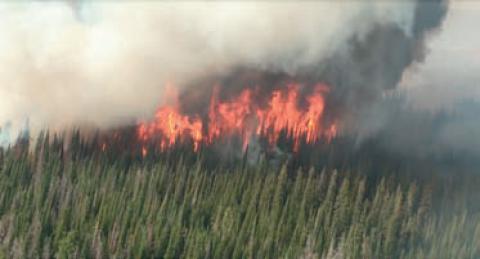Quantifying the Potential Effects of Mountain Pine Beetle on Wildland Fire Behavior
Many areas of the Rocky Mountain West continue to be affected by the mountain pine beetle (Dendroctonus ponderosae) due, in part, to single-age stands and warmer climate. FFS scientists have continued to investigate changes in foliar chemistry and moisture in affected stands and how they impact fire behavior. In laboratory tests, flaming embers were dropped into collected pine needles from beetle-affected trees. Needles with moisture levels in the mid-teens consistently caught fire from a single ember. Additionally, FFS scientists found that the red needles of attacked trees ignite three times faster than the needles of healthy trees and that both foliar chemistry and needle moisture content were the most important factors in determining a needle’s flammability. This suggests that forests with large number of beetle-killed trees are at a significantly higher risk of burning as actively spreading crown fires.
Crown fires cannot be directly suppressed by ground resources, and are very dangerous to firefighters and communities. Researchers are continuing to test the rates of needle loss, simulated fire behavior, and detection. While still ongoing, this research provides justification for fuel treatments in beetle-killed forests, helps to increase firefighter awareness of dangerous situations, and assists managers in identifying areas at high risk for ignition and extreme fire behavior. Because of its importance and potential to save lives, preliminary results have been presented to regional fire managers.
